
 Bachelor's and Master's degree in Chemistry at Università degli studi di Perugia, with both thesis projects focused on the analysis of data from an environmental monitoring station. The study on atmospheric Black Carbon continued at the same university for a few months after graduation.
Bachelor's and Master's degree in Chemistry at Università degli studi di Perugia, with both thesis projects focused on the analysis of data from an environmental monitoring station. The study on atmospheric Black Carbon continued at the same university for a few months after graduation.
From November 2021 she is a PhD student at Università G. D'Annunzio di Chieti-Pescara, with a project revolving around the study of radiation budget and cloud cover in Antarctica and carried out at the CNR-ISP in Bologna.
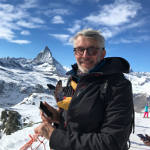 Since July 2019 is Full Professor at Department of Science of the University Roma Tre. From 1983 to 2019 was Senior Researcher at ENEA. In the period 1983-1990 he worked on geological research for nuclear power sites and on glacial, aeolian and alluvial deposits in order to study paleoclimatic variations in Central Italy. Since 1985 he has been working on glaciology and remote sensing, applied to the study of cryosphere and climate variability of East Antarctica.
Since July 2019 is Full Professor at Department of Science of the University Roma Tre. From 1983 to 2019 was Senior Researcher at ENEA. In the period 1983-1990 he worked on geological research for nuclear power sites and on glacial, aeolian and alluvial deposits in order to study paleoclimatic variations in Central Italy. Since 1985 he has been working on glaciology and remote sensing, applied to the study of cryosphere and climate variability of East Antarctica.
He has joined 15 PNRA expeditions to Antarctica. Since 1992 Principal investigator of 10 projects on ice sheet mass balance and 1000 years evolution of East Antarctica for the Antarctic Italian Program as well as member of the Steering committee of the Concordia Station, SCAR/IGBP ITASE, ISMASS, IPICS e EuroPICS programs. Since 2014 is President of Italian Glaciological Committee. His publication list comprises more than 100 peer-reviewed papers. He is referee of several international Journals and research programme in the field of cryosphere and paleoclimate.
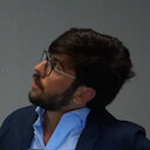 Master’s degree in environmental sciences at the University of Pisa. After a two-months period at the National Natural history Museum in Luxembourg, and after a period spent as a research fellow in the University of Pisa, I enrolled in the Polar Science Ph.D. program at the university of Ca’Foscari in Venice. My research revolves around paleoenvironmental reconstruction in Antarctica’s fjord utilizing calcareous microfossils.
Master’s degree in environmental sciences at the University of Pisa. After a two-months period at the National Natural history Museum in Luxembourg, and after a period spent as a research fellow in the University of Pisa, I enrolled in the Polar Science Ph.D. program at the university of Ca’Foscari in Venice. My research revolves around paleoenvironmental reconstruction in Antarctica’s fjord utilizing calcareous microfossils.
![]() https://orcid.org/0009-0008-2199-379X Research gate
https://orcid.org/0009-0008-2199-379X Research gate
 Full Professor at the Ca’ Foscari University of Venice. Since 2003 he has supervised teaching activities in the Degree Courses in Chemistry, in Chemical Sciences for Conservation and Restoration (SCCR), in Materials Science and Technologies and in Environmental Sciences. His research is focused mainly on: 1) studies on the origin, seasonal evolution and environmental fate of organic sulfur compounds of biological origin (dimethyl sulfide, carbon sulfide and dimethyl sulfonyopropionate) produced in the aquatic system; 2) development of analytical methodologies for the determination of organic micro pollutants (PCB, PAH, PCN, PBDE, PCDD, PCDF, IA) in environmental matrices (water, sediment, atmospheric aerosol) by gas chromatography coupled to both low and high resolution mass spectrometry; 3) development of analytical methodologies for the determination of natural organic compounds (amino acids, sugars, methoxyphenols, algal and fungal toxins, etc.. ) and anthropic (fragrances, aromatic pollutants) in water, biota, aerosol, snow and ice by liquid chromatography coupled with mass spectrometry for the study of local, global contamination and climate change. This activity has led to collaborations with various research groups (Griffith University, Australia; University of Charleston, U.S.A.; Boston College, U.S.A.; University of Sarajevo, Bosnia and Herzegovina; University of Belgrade, Serbia; Aristotle University of Thessaloniki, Greece; University of Rijeka, Croatia; University of Tirana, Albania, etc.. ).
Full Professor at the Ca’ Foscari University of Venice. Since 2003 he has supervised teaching activities in the Degree Courses in Chemistry, in Chemical Sciences for Conservation and Restoration (SCCR), in Materials Science and Technologies and in Environmental Sciences. His research is focused mainly on: 1) studies on the origin, seasonal evolution and environmental fate of organic sulfur compounds of biological origin (dimethyl sulfide, carbon sulfide and dimethyl sulfonyopropionate) produced in the aquatic system; 2) development of analytical methodologies for the determination of organic micro pollutants (PCB, PAH, PCN, PBDE, PCDD, PCDF, IA) in environmental matrices (water, sediment, atmospheric aerosol) by gas chromatography coupled to both low and high resolution mass spectrometry; 3) development of analytical methodologies for the determination of natural organic compounds (amino acids, sugars, methoxyphenols, algal and fungal toxins, etc.. ) and anthropic (fragrances, aromatic pollutants) in water, biota, aerosol, snow and ice by liquid chromatography coupled with mass spectrometry for the study of local, global contamination and climate change. This activity has led to collaborations with various research groups (Griffith University, Australia; University of Charleston, U.S.A.; Boston College, U.S.A.; University of Sarajevo, Bosnia and Herzegovina; University of Belgrade, Serbia; Aristotle University of Thessaloniki, Greece; University of Rijeka, Croatia; University of Tirana, Albania, etc.. ).
As part of the National Antarctic Research Programme he was responsible for Research Unit (UO) in 2004-2006; Principal Investigator in 2010-2012; responsible of UO in 2013-2014 and since 2016.
The research activity has led to the publication of over 140 publications of which 126 appear on SCOPUS, 10 chapters of books and about 200 communications at national and international conferences (h-index= 30).
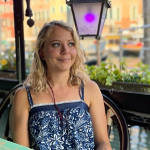 She is a PhD student in Polar Science at Ca’ Foscari University of Venice. Her PhD project is focused on the analysis of organic compounds and trace elements present in ice cores to reconstruct the evolution of the anthropogenic footprint. In April 2021, she successfully graduated in Environmental Sciences following international curriculum “Global environmental change” at the same university. During her master thesis, she worked on paleofire reconstructions through the analysis of organic compounds present in traces within an Australian stalagmite.
She is a PhD student in Polar Science at Ca’ Foscari University of Venice. Her PhD project is focused on the analysis of organic compounds and trace elements present in ice cores to reconstruct the evolution of the anthropogenic footprint. In April 2021, she successfully graduated in Environmental Sciences following international curriculum “Global environmental change” at the same university. During her master thesis, she worked on paleofire reconstructions through the analysis of organic compounds present in traces within an Australian stalagmite.
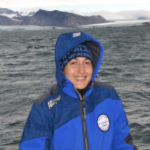 2016-2019: Master Degree in Marine Biology (110/110 cum laude) at the Alma Mater Studiorum University of Bologna - Ravenna Campus. Thesis title: "Bioaccumulation of legacy and emerging contaminants in tuna species".
2016-2019: Master Degree in Marine Biology (110/110 cum laude) at the Alma Mater Studiorum University of Bologna - Ravenna Campus. Thesis title: "Bioaccumulation of legacy and emerging contaminants in tuna species".
2020-in progress: PhD in Polar Science at Ca' Foscari University of Venice. My PhD project focuses on the analysis of persistent organic pollutants (regulated and emerging) in marine sediment cores collected in the Kongsfjorden-Krossfjorden fjord system (Svalbard Archipelago, Arctic), in order to: 1) evaluate the concentration levels and temporal trends of target contaminants in the sediment cores; 2) understand the temporal variability and fluxes of contaminants in the Arctic marine environment; and 3) define the sources of contamination in the investigation area.
In 2021 I spent two months (from the end of August to the end of October) at the Arctic Station 'Dirigibile Italia' in Ny-Ålesund, during which I took part both in the sampling activities of the sediment cores that were analysed for my PhD project, and in the management activities of the research station, working together with the station leader in charge at the time. In 2022 I spent 20 days (September) in Ny-Ålesund, thanks to an Arctic Field Grant, during which I sampled surface marine sediments in Kongsfjorden and Krossfjorden.
 Bachelor in Geology at the Federal University of Rio Grande do Sul (UFRGS) and Master in Geochemistry from the same University. Since 2022 is developing his PhD thesis at Ca’ Foscari University of Venice in the program of Polar Sciences studying organic molecules in an Andean ice core to unveil the paleofire history in the Amazon region.
Bachelor in Geology at the Federal University of Rio Grande do Sul (UFRGS) and Master in Geochemistry from the same University. Since 2022 is developing his PhD thesis at Ca’ Foscari University of Venice in the program of Polar Sciences studying organic molecules in an Andean ice core to unveil the paleofire history in the Amazon region.
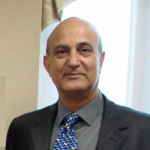 Since 1990 he is full professor of Ecology at the Faculty of Science of the University of Messina (Italy). General Secretary in the following NATO courses coordinated by Dr Trevor Platt, Halifax, Canada: (a) Lipari Island, Italy (12-24 October 1980) on Physiological ecology of Phytoplankton, (b) Bombannes (Bordeaux, France 12-20 May 1982) on Flows of energy and materials in marine ecosyistems: theory and practice, (c) S. Miniato, Italy (1-7 October 1985) on Physiological Ecology of photosynthetic Picopl9ankton in the Ocean. From 1990 to 2002, Italian Delegate to the Scientific Commission of the CCAMLR (Commission for the Conservation of Antarctic Marine Living Resources, Hobart (Tasmania, Australia). Over 60 months accumulated research experience at sea, including the following PNRA Italian Antarctic Expeditions as Principal Investigator: III Exp. (Terra Nova Bay Ecosystem,1987-88), V (South Pacific Sector,1989-90), X ROSSMIZE (Ross Sea Marginal Ice Zone Ecology,1994-95), XIII PIPEX (Pack Ice Plankton Expedition,1997-98), XV PIED (Pack Ice Ecosystem Dynamics 1999-2000), XX SEAROWS (Sea ice Ecology in the Antarctic: ROss and Weddell Seas) on the Polar Queen, Cariboo, Italica (1987-2002), Peri-Antarctic Oceanographic Expeditions in the Strait of Magellan I (1991) and II (1995), and one Arctic canadian cruise by N/R Hudson (1980). He has been Scientific Responsible of the Operative Unit Zooplankton and Micronekton in the following European projects: VECTOR, RITMARE, COCONET, MARINE STRATEGY. From 1968 to now, his research activity has been continuously addressed to issues on the zooplankton and micronekton ecology and biodiversity. Its main fields of study concern: (a) spatio-temporal distribution and daily vertical migrations (DVM) of marine zooplankton and micronekton communities in the Mediterranean and Polar ecosystems, in relation to the physical, chemical and biological water mass structure) (b) brackish environments functioning and biological response to stressor variables, (c) functioning of the coastal and pelagic food chain, with particular regard to the role of euphausiid and mesopelagic fish in the Deep Scattering Layer (DSL) (d) zooplankton role in the carbon cycle, (e) particles size spectrum (OPC) in the study of aquatic ecosystems (f) effects of climate change on the biology and ecology of Antarctic sea-ice and free water zooplankton communities. During 18 PNRA Antarctic expeditions (1987-2018) in Terra Nova Bay, Ross Sea and South Pacific Sector in free water and pack-fast-ice he collected about 6000 samples which are part of the zooplankton and micronekton collection laboratory of the University of Messina. In addition to the classic mesozooplankton and micronekton such as WP2, Indian Ocean Standard Net (IOSN), Bongo 40, IKMT, PHN, advanced electronic multinet are part of its field instrumentation such as BIONESS (1 m2) with 12 nets, MININESS (0.25 m2) with 10 nets 200, 500 and 1000 um, MICRONESS with 4 100 um nets, equipped with a multiparametric probe seabird 11 plus, fluorescence sensor and Optical Plankton Counter (OPC).
Since 1990 he is full professor of Ecology at the Faculty of Science of the University of Messina (Italy). General Secretary in the following NATO courses coordinated by Dr Trevor Platt, Halifax, Canada: (a) Lipari Island, Italy (12-24 October 1980) on Physiological ecology of Phytoplankton, (b) Bombannes (Bordeaux, France 12-20 May 1982) on Flows of energy and materials in marine ecosyistems: theory and practice, (c) S. Miniato, Italy (1-7 October 1985) on Physiological Ecology of photosynthetic Picopl9ankton in the Ocean. From 1990 to 2002, Italian Delegate to the Scientific Commission of the CCAMLR (Commission for the Conservation of Antarctic Marine Living Resources, Hobart (Tasmania, Australia). Over 60 months accumulated research experience at sea, including the following PNRA Italian Antarctic Expeditions as Principal Investigator: III Exp. (Terra Nova Bay Ecosystem,1987-88), V (South Pacific Sector,1989-90), X ROSSMIZE (Ross Sea Marginal Ice Zone Ecology,1994-95), XIII PIPEX (Pack Ice Plankton Expedition,1997-98), XV PIED (Pack Ice Ecosystem Dynamics 1999-2000), XX SEAROWS (Sea ice Ecology in the Antarctic: ROss and Weddell Seas) on the Polar Queen, Cariboo, Italica (1987-2002), Peri-Antarctic Oceanographic Expeditions in the Strait of Magellan I (1991) and II (1995), and one Arctic canadian cruise by N/R Hudson (1980). He has been Scientific Responsible of the Operative Unit Zooplankton and Micronekton in the following European projects: VECTOR, RITMARE, COCONET, MARINE STRATEGY. From 1968 to now, his research activity has been continuously addressed to issues on the zooplankton and micronekton ecology and biodiversity. Its main fields of study concern: (a) spatio-temporal distribution and daily vertical migrations (DVM) of marine zooplankton and micronekton communities in the Mediterranean and Polar ecosystems, in relation to the physical, chemical and biological water mass structure) (b) brackish environments functioning and biological response to stressor variables, (c) functioning of the coastal and pelagic food chain, with particular regard to the role of euphausiid and mesopelagic fish in the Deep Scattering Layer (DSL) (d) zooplankton role in the carbon cycle, (e) particles size spectrum (OPC) in the study of aquatic ecosystems (f) effects of climate change on the biology and ecology of Antarctic sea-ice and free water zooplankton communities. During 18 PNRA Antarctic expeditions (1987-2018) in Terra Nova Bay, Ross Sea and South Pacific Sector in free water and pack-fast-ice he collected about 6000 samples which are part of the zooplankton and micronekton collection laboratory of the University of Messina. In addition to the classic mesozooplankton and micronekton such as WP2, Indian Ocean Standard Net (IOSN), Bongo 40, IKMT, PHN, advanced electronic multinet are part of its field instrumentation such as BIONESS (1 m2) with 12 nets, MININESS (0.25 m2) with 10 nets 200, 500 and 1000 um, MICRONESS with 4 100 um nets, equipped with a multiparametric probe seabird 11 plus, fluorescence sensor and Optical Plankton Counter (OPC).
Research results are documented in more than 240 papers on national and international peer journals. Editor of these books: Atlas of Marine Zooplankton Strait of Magellan I Copepods (1995) and II Amphipods, Mysids, Euphausiids, Ostracods, Chaetognaths, Springer Verlag (1996); Ross Sea Ecology, Springer Verlag 2000; Mediterranean Ecosystems Structure and Processes, Springer Verlag (2001). Editor of the Research Topic "Ecology of Marine Zooplankton and Micronekton in Polar and Sub-Polar Areas” in Frontiers in Marine Biology (2023-2024).
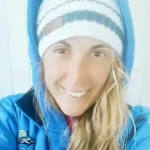 Marine biologist and oceanographer, Serena got three degrees from different universities: the undergraduate in Biological Sciences at the University of Genova, the master in marine biology at the University Politecnica delle Marche in Ancona, another master in 'Applied Physical Oceanography' at the University of Malta. She studied in detail the algae reproduction as well as the anchovies reproduction, while her specialisation as a marine biologist was about the study of the Sperm whales' acoustic. She wanted to protect the oceans and who lives in them, therefore in Malta she specialised into the study of the plastic pollution, with the use of a drone, deriving from an oceanic input as well as from humans, as a definition of a non education about the environment. Furthermore, her desire to know more in detail about other cetaceans species brought her for different summer seasons to Husavik, Iceland, working as a whale watching guide. From the humpback whales and the blue whales to the curiosity of knowing more about the ice, while looking at the glaciers in Iceland. Since then, she became a PhD student at the University of Ca' Foscari of Venice, in collaboration with the University of Milan-Bicocca, where she is studying the RICE ice core, in particular the fossils that she is finding into the core and the reason why they are there.
Marine biologist and oceanographer, Serena got three degrees from different universities: the undergraduate in Biological Sciences at the University of Genova, the master in marine biology at the University Politecnica delle Marche in Ancona, another master in 'Applied Physical Oceanography' at the University of Malta. She studied in detail the algae reproduction as well as the anchovies reproduction, while her specialisation as a marine biologist was about the study of the Sperm whales' acoustic. She wanted to protect the oceans and who lives in them, therefore in Malta she specialised into the study of the plastic pollution, with the use of a drone, deriving from an oceanic input as well as from humans, as a definition of a non education about the environment. Furthermore, her desire to know more in detail about other cetaceans species brought her for different summer seasons to Husavik, Iceland, working as a whale watching guide. From the humpback whales and the blue whales to the curiosity of knowing more about the ice, while looking at the glaciers in Iceland. Since then, she became a PhD student at the University of Ca' Foscari of Venice, in collaboration with the University of Milan-Bicocca, where she is studying the RICE ice core, in particular the fossils that she is finding into the core and the reason why they are there.
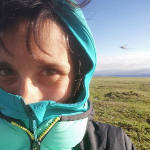 She attained the master’s degree with honours in Applied and Environmental Geology at the University of Turin in 2010, with a thesis entitled Distribution, origin and consequences of fluoride content in groundwater in an area of the central sector of the Ethiopian Rift. She specialized in the collection, analysis and dissemination of data in developing countries and in geological and hydrogeological mapping and modelling through GIS data management. The working experience in the Alpine environment allowed the deepening into pedological and geochemical subjects. She worked as study grant holder on the Nunataryuk EU-funded Horizon 2020 project, coordinated by the Alfred Wegener Institute, that aims to assess arctic permafrost thaw and study how it contributes to climate change.
She attained the master’s degree with honours in Applied and Environmental Geology at the University of Turin in 2010, with a thesis entitled Distribution, origin and consequences of fluoride content in groundwater in an area of the central sector of the Ethiopian Rift. She specialized in the collection, analysis and dissemination of data in developing countries and in geological and hydrogeological mapping and modelling through GIS data management. The working experience in the Alpine environment allowed the deepening into pedological and geochemical subjects. She worked as study grant holder on the Nunataryuk EU-funded Horizon 2020 project, coordinated by the Alfred Wegener Institute, that aims to assess arctic permafrost thaw and study how it contributes to climate change.
Present position: PhD Student at University Ca' Foscari Venezia, PhD in Polar Sciences; title of proposal: Modelling the fate of POPs distribution in permafrost: combine large scale to local perspective.
More...
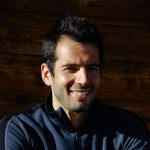 He received his master degree in nuclear and particle physics from Milano-Bicocca University in 2014. His background ranges from applied particle physics to environmental radioactivity and high-energy physics. His work at the nuclear fission reactor in Pavia (Italy) introduced him to the ice core science field. He did his PhD (2014-2017) at the Niels Bohr Institute (Copenhagen, Denmark), working on ice core continuous flow analysis systems and past sea ice reconstructions. He continued his research on climate reconstructions at the Niels Bohr Institute, at the Italian National Research Council and at the University of Venice in 2018 and 2019. Between 2020 and 2022 he was Marie Curie fellow at the University of Venice with a project on computer vision and Artificial Intelligence techniques applied to ice core analyses. Since September 2022 he works on glacier modeling via deep neural networks in collaboration with the University of California, Irvine. He is particularly interested in exploring AI and Machine Learning approaches to Earth System Science problems.
He received his master degree in nuclear and particle physics from Milano-Bicocca University in 2014. His background ranges from applied particle physics to environmental radioactivity and high-energy physics. His work at the nuclear fission reactor in Pavia (Italy) introduced him to the ice core science field. He did his PhD (2014-2017) at the Niels Bohr Institute (Copenhagen, Denmark), working on ice core continuous flow analysis systems and past sea ice reconstructions. He continued his research on climate reconstructions at the Niels Bohr Institute, at the Italian National Research Council and at the University of Venice in 2018 and 2019. Between 2020 and 2022 he was Marie Curie fellow at the University of Venice with a project on computer vision and Artificial Intelligence techniques applied to ice core analyses. Since September 2022 he works on glacier modeling via deep neural networks in collaboration with the University of California, Irvine. He is particularly interested in exploring AI and Machine Learning approaches to Earth System Science problems.
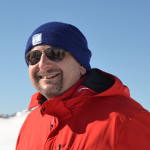 PhD thesis in Earth Science in 1993.
PhD thesis in Earth Science in 1993.
From 1990 to 1992 participate to the GRIP (Greenland ice core project) project, for the deep drilling in the central of Greenland ice Sheet. Participate to the 10 Antarctic field seasons (from 1992 to 2008) of Italian Antarctic Expeditions, for firn drillings in the Northern Victoria Land and Dome C. Has been PI in the UE AlpClim Project on the climatic characterization from Alpine ice cores, PI of IMONT (Italian Institute for Mountain Research) project CryoAlp and coordinator of 3 ISPESL (Italian Institute for Work Safety) projects on the anthropogenic impact on the Mediterranean area. From 2002 is Italian representative of the EPICA Steering Committee. Was member of the scientific committee of Project of Strategic Interest NEXTDATA of CNR (2012-2018). Was representative of the Paleoclimate Committee of the International Quaternary Association (INQUA).
From 2004 is member of the International Glaciological Society (IGS) and, from 1997, also member of the American Geophysical Union (AGU). He is member of the Italian Quaternary Association (AIQUA), the Italian Physical Geography and Geomorphology Association (AIGEO) and is Vice-President Italian Glaciological Committee (CGI). It is representative of the UNIMIB in Fondazione Lombardia per l’Ambiente (FLA), and UNIMIB representative in the Climate Change Working Group of the Rete Italiana delle Università per lo Sviluppo Sostenibile (RUS). It is Chair the Table 9 Mountain Territory and Biosphere, part of the Stati Generali della Montagna of the Italian Ministry of Regional Affair. President of the UIS Commission on Snow, Firn and Ice Caves.
In 2008 was a winner of EU Descartes Prize, with other 10 European colleagues, for the Collaborative Research.
The main research topics are the characterization atmospheric dust, mainly in Antarctica, Greenland and Alpine areas, and long-term paleoclimatic influences of mineral phases on the atmosphere. Identification of the source areas of mineral dust and evolution of the solid charge in atmosphere in the last 800 ky. Author and co-author of more than 100 scientific papers on the international journals.
From 2018 is Full Professor in the University of Milano-Bicocca at the Earth and Environmental Sciences Dep.
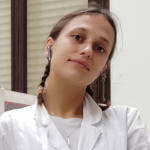 Graduated in Experimental and Applied Biology, Environmental Biology and Biodiversity curriculum at the University of Pavia with the thesis Biodegradation of polyethylene (PET ) and polylactic acid (PLA) using Fusarium sp. and evaluation of enzymatic activity. During the bachelor degree, she carried out a short period of study and research at the Marine Research and High Education (MaRHE) center, on the island of Magoodhoo, in the Maldivian Archipelago, where she focused on marine ecology and safeguard of biological systems, related to the coral reef. During the master degree, she took part in the monitoring of alien species project, in the Marine Protection Area of the Porto Venere Regional Park at ENEA, implementing the previous knowledge and techniques of sampling, treatment, and analysis of marine samples. Thanks to internships in microbiology and mycology, experienced during bachelor and master career respectively, she was able to learn techniques of microbiological analysis associated with recalcitrant materials, deepening associated with plastics. Currently, she caries out research activities for the identification and characterization of antibiotic resistant and virulent environmental vectors in coastal marine areas and deep environments at the Institute of Polar Sciences (CNR-ISP) of Messina.
Graduated in Experimental and Applied Biology, Environmental Biology and Biodiversity curriculum at the University of Pavia with the thesis Biodegradation of polyethylene (PET ) and polylactic acid (PLA) using Fusarium sp. and evaluation of enzymatic activity. During the bachelor degree, she carried out a short period of study and research at the Marine Research and High Education (MaRHE) center, on the island of Magoodhoo, in the Maldivian Archipelago, where she focused on marine ecology and safeguard of biological systems, related to the coral reef. During the master degree, she took part in the monitoring of alien species project, in the Marine Protection Area of the Porto Venere Regional Park at ENEA, implementing the previous knowledge and techniques of sampling, treatment, and analysis of marine samples. Thanks to internships in microbiology and mycology, experienced during bachelor and master career respectively, she was able to learn techniques of microbiological analysis associated with recalcitrant materials, deepening associated with plastics. Currently, she caries out research activities for the identification and characterization of antibiotic resistant and virulent environmental vectors in coastal marine areas and deep environments at the Institute of Polar Sciences (CNR-ISP) of Messina.
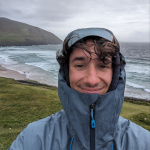 I am a Ph.D. candidate at the University of Milano-Bicocca in Milan, Italy.
I am a Ph.D. candidate at the University of Milano-Bicocca in Milan, Italy.
My background includes a bachelor's degree in Physics and Astrophysics from the University of Florence, followed by a master's degree in Physics of the Earth System at the University of Bologna.
My research focuses on snow and ice multispectral remote sensing, where I investigate the physical properties of the snowpack and the radiative effects that dust and algae have on it. Beyond my primary research, I am interested in drones, instrumentation, and atmospheric dynamics.
 Ministero dell'Universita e Ricerca
Ministero dell'Universita e Ricerca
Programma Ricerche Artico
Programma Nazionale di Ricerca in Antartide
 Ministero degli Affari Esteri e della Cooperazione Internazionale
Ministero degli Affari Esteri e della Cooperazione Internazionale
L'Italia e l’Artico
L’Italia e l’Antartide
CNR-ISP
National Research Council
Institute of Polar Sciences
c/o Scientific Campus - Ca' Foscari University Venice - Via Torino, 155 - 30172 VENEZIA MESTRE (VE)
Phone: +39 041 2348547 - E-mail: protocollo.isp AT pec.cnr.it
Fax: +39 041 2348 549 - Codice Fiscale: 80054330586 - P.I.:02118311006
Unless otherwise indicated, the content of this site is licensed : Attribution Non Commercial Share Alike 4.0 International (CC BY-NC-SA 4.0)
Privacy policy e Cookie policy - Transparent administration (CNR)








